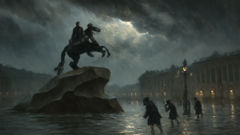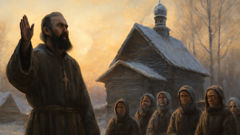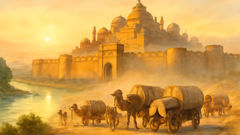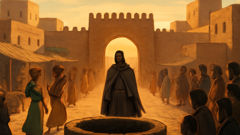Introduction
Beneath a sky heavy with rain, St. Petersburg stands as both a marvel and a warning—Peter the Great’s ambitious city, wrested from the marshes and channeled by willpower into symmetry and grandeur. Wide avenues and stately facades line the Neva, palaces rise from the embankments, and at the city’s heart, on Senate Square, the Bronze Horseman rears—a monument as much to vision as to rule. This statue, cast in gleaming bronze, captures the founder’s indomitable spirit, his gaze fixed toward the future, his horse’s hooves lifted above the earth as if conquering not just land but destiny itself. But for every imperial dream, there are thousands of quiet lives trying to find warmth and shelter against the raw elements of Russia’s north. In the autumn of 1824, those lives would be tested as the Neva broke its banks and the city became an island battered by wind and water. The flood was not just a calamity of nature, but a reckoning—a question whispered between the thundering waves and echoing in every sodden street: What does it mean to build a city on hope, and what does it cost the souls who live beneath its monuments? This story follows Yevgeny, a humble clerk with dreams as modest as a dry room and a beloved by his side, as he faces the deluge that will upend his world. Through his eyes, we see not only the grandeur and peril of St. Petersburg but the timeless struggle between the needs of the many and the hopes of the one.
I. The City of Peter
St. Petersburg’s birth was always tinged with myth. Legends told of Peter wading through marshes, of laborers dying by the thousands as they laid the city’s bones in the earth’s watery embrace. But by the early 1800s, the city had become something tangible and undeniable. Its palaces and cathedrals glittered with imperial ambition, while humble courtyards echoed with the laughter and laments of ordinary folk. At dawn, the city’s canals steamed with the exhalations of the Neva, and the bells of St. Isaac’s Cathedral tolled over a population half-dreaming and half-dreading the day ahead.
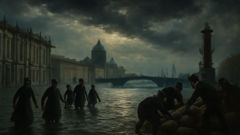
Yevgeny was one among those countless souls. His room was high up in a tenement on Vasilievsky Island, close enough to the river to hear its midnight conversations, far enough from the central squares to feel perpetually on the city’s margins. His life was a threadbare but precious tapestry: the modest desk at the city’s records office, the letters he penned in cramped script, the hope that each ruble earned might bring him closer to Parasha, the milliner’s daughter with a laugh as bright as winter sunlight. For Yevgeny, the city was not an empire; it was a series of small certainties—the bakery’s warmth in winter, the borrowed books that sustained him, and the promise of a simple life together with the woman he loved.
Yet even in peace, St. Petersburg was never truly safe. The Neva was a constant threat, its moods as volatile as any czar’s. Sometimes, standing on the embankment after work, Yevgeny would watch the river churn and think of the old tales—of how the land still remembered being swamp and sea, and how every stone placed by Peter was defiance incarnate. He saw children skipping over puddles in spring, heard old women muttering about omens, and sometimes, when the wind was just right, felt the city shiver with all the memories it could never quite bury.
On the night before the flood, Yevgeny sat in his room writing a letter to Parasha. It was filled with small hopes: perhaps a Sunday walk in the Summer Garden, a visit to the theater, dreams of a shared future. Rain rattled at his window, but he paid it little mind—after all, storms were common here. But this night, the rain did not stop. It hammered the roofs, filled the gutters, and turned the alleys to rivulets. By morning, the city was already transformed; water pooled in the streets, and anxious voices rose beneath every archway.
As Yevgeny hurried to the office, he saw the first signs that this was no ordinary autumn storm. The bridges were crowded with people peering at the swollen river. Rowboats bobbed in the rising current, and shopkeepers nailed boards across their doors. Soldiers in greatcoats patrolled the embankments, and whispers of evacuation plans swirled through the marketplace. Still, Yevgeny clung to routine; he filed his papers, kept his head down, and tried to ignore the slow dread blooming inside him.
But by midday, the Neva had breached its banks. Water surged through the streets, sweeping away carts and barrels, flooding cellars and shops. The city’s grandeur became a liability—its broad avenues turned to rivers, its proud monuments stranded on islands of stone. News spread quickly: parts of Vasilievsky Island were already underwater, and the poorer quarters were being evacuated. Panic simmered beneath the surface; some clung to hope, others to superstition. In the city’s heart, the Bronze Horseman stood untouched, a sentinel above the chaos. For Yevgeny, there was only one thought: he must find Parasha and ensure her safety before the flood stole everything they had not yet built.
II. Rising Waters, Raging Hearts
Yevgeny pressed through the crowds along the embankment, the roar of the river almost drowning out the wail of distant church bells. Each step was a battle; icy water surged around his boots, tugging at his coat, numbing his fingers. The city that yesterday had seemed so solid and orderly was now wild, untamed—a labyrinth of currents and debris. Gulls circled overhead, crying out as rooftops disappeared beneath the churning tide. The wind whipped banners from government buildings, and the air was thick with the scent of mud and fear.
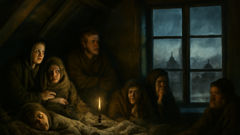
He reached the quarter where Parasha lived to find devastation. Her street was half-submerged, the familiar bakery’s windows smashed by the force of the water. Wooden carts floated like coffins, and a horse struggled against its harness, eyes wild with terror. Yevgeny called her name above the din, pushing past neighbors who clung to each other or ferried their belongings atop makeshift rafts. At last he found her—Parasha, soaked and shivering, standing with her mother and a clutch of others in the lee of a crumbling archway.
Relief and terror mingled in his chest as he embraced her. She clung to him, eyes wide with fear but alive with stubborn hope. Together, they joined the exodus of refugees making their way toward higher ground, dodging collapsed fences and overturned carriages. Yevgeny promised Parasha’s mother he would keep her safe, but every step felt like defiance against something vast and pitiless. They passed a chapel where candles flickered against the flood; an old priest intoned prayers while a handful of parishioners sang hymns that struggled to rise above the howl of wind.
As the hours dragged on, the city’s true shape seemed to dissolve. The floodwaters reflected not just rooftops but the anxiety etched onto every face. News reached them that the Czar’s own palace was threatened, that some of the grandest halls had become islands in the rising sea. Yevgeny saw a carriage, its horses abandoned, bobbing against a stone lion on the Admiralty embankment. He wondered if Peter himself, could he see this day, would feel pride or dread at his creation’s peril.
Through it all, Yevgeny’s resolve hardened. He carried Parasha when she could walk no further, offered what little food he had, and shielded her from the cold with his own coat. But as night fell and the temperature dropped, despair crept in. They found refuge in an attic crowded with other families, sharing stories and scraps of bread while outside, the city groaned beneath the weight of water. Yevgeny dozed fitfully, haunted by visions of the Horseman—the statue’s gaze seeming to follow him through every dream, an iron reminder that in this city, no one could escape history or fate.
III. The Statue’s Shadow
The next day dawned gray and heavy with mist. The storm had abated, but the water lingered—restless, refusing to recede. From their attic refuge, Yevgeny looked out across a city transformed. Smoke curled from drowned chimneys, while rescue boats plied avenues that had become canals. News spread in frightened whispers: some bridges had collapsed, others barely stood. The czar’s officials moved through the disaster, organizing relief and guarding against panic, but for most, it was a matter of endurance and prayer.
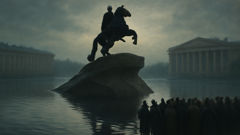
Yevgeny’s mind turned constantly to Senate Square. In his childhood, he’d marveled at the Bronze Horseman—how its shadow fell like a benediction or a warning across the stones. Now, amid devastation, the statue seemed more present than ever. It stood atop its granite pedestal, unyielding, as if mocking both the river and those who lived in its shadow. Some said Peter’s spirit watched over the city; others whispered that he demanded sacrifice for every triumph.
Driven by restlessness and a need for answers, Yevgeny braved the flooded streets alone. He made his way through alleys where the water reached his waist, past abandoned shops and ruined gardens. At Senate Square, he found a crowd gathered, silent and awed. The statue loomed above them—Peter astride his horse, arm outstretched toward the future. Below, the square was a lake, and the reflections of both horse and emperor danced on its surface.
For Yevgeny, it was a moment of reckoning. He thought of all he had lost—the certainty of his home, the safety of routine—and all he still risked losing. Parasha’s future was uncertain; her family’s shop ruined, their savings swept away by the flood. Yet amid the silence, something shifted within him. He saw not just the grandeur of Peter’s vision but its cost: the lives uprooted, the humble dreams washed aside in the pursuit of greatness.
A city, he realized, was both monument and memory—each stone laid by ambition, each alleyway carved by hope and heartbreak. As Yevgeny stood beneath the Horseman’s shadow, drenched and shivering, he whispered a promise: he would not be crushed by fate or forgotten by history. He would persevere—not for glory, but for love. The statue’s bronze gaze met his own, and for a heartbeat, it seemed to nod in grim approval.
Conclusion
In the days that followed, St. Petersburg slowly clawed its way back from disaster. The waters receded, leaving behind silt and sorrow. Citizens emerged from attics and upper rooms to salvage what remained—books dried on window ledges, bread baked from rescued flour, laughter hesitant but persistent in battered courtyards. The city, bruised but unbroken, bore new scars. The monuments endured, as did the memories of those who had lost everything. Yevgeny and Parasha, though forever changed, found a kind of hope amid the ruins. They rebuilt not with grand plans but with quiet resolve—patching walls, sharing meals, dreaming again in defiance of uncertainty. The Bronze Horseman remained atop Senate Square, silent and inscrutable as always. For some, it stood as a symbol of ambition unbowed by nature; for others, a reminder that every city is built upon both vision and sacrifice. Yet for Yevgeny, it became something more—a witness to endurance, proof that even in the shadow of empires, individual hearts could persist. The flood of 1824 passed into legend, but its lessons lingered: that no monument can shield a city from fate, and that in every deluge, it is the courage of ordinary people that keeps hope afloat.

